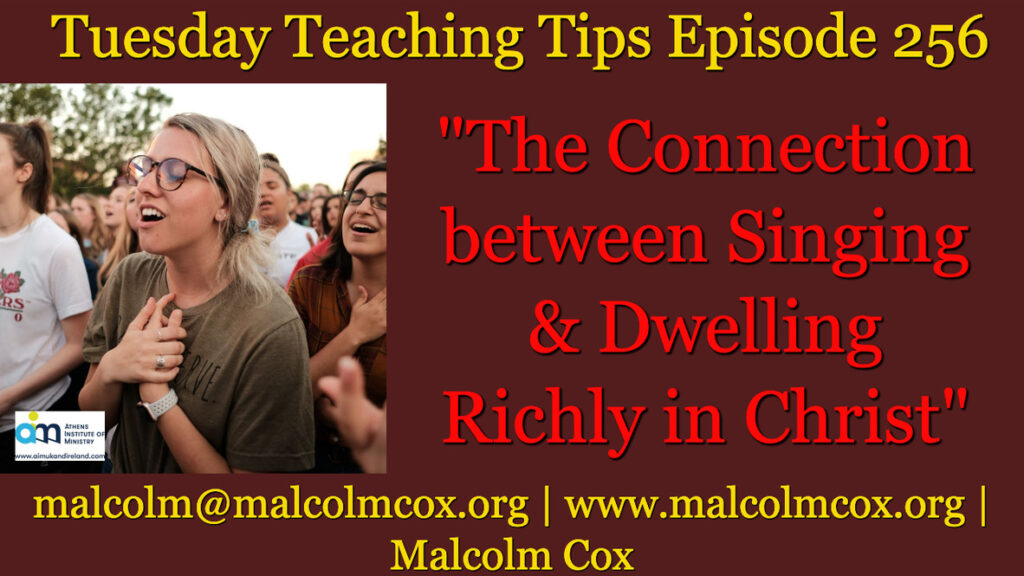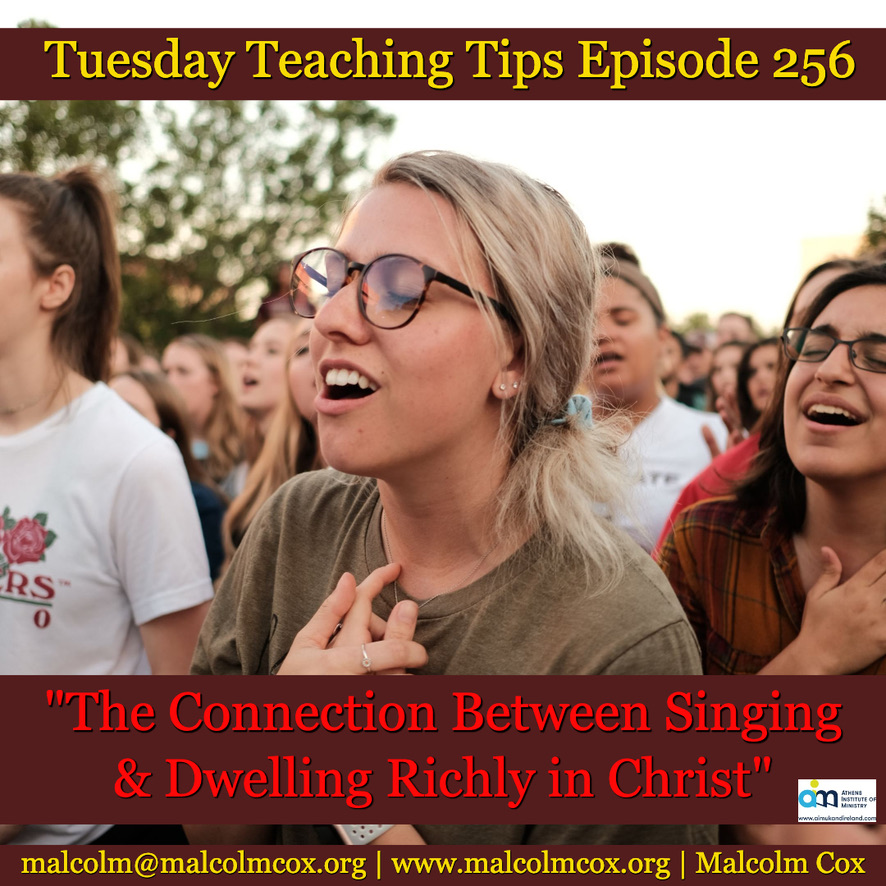Tuesday Teaching Tips | Episode 256

Why do we sing?
“Let the message of Christ dwell among you richly as you teach and admonish one another with all wisdom through psalms, hymns, and songs from the Spirit, singing to God with gratitude in your hearts.” Col 3:16
Background
The church in Colossae was made up of house churches of around 30-50 people (Philemon 1:2).
Many ‘gods’ were worshipped in this part of Asia Minor and the Apostle Paul is concerned about syncretism (in this context the blending together of Christian and Pagan worship). Therefore he centres the letter on the sufficiency of Christ and his unique nature. Read the chapters that come before this one to get a feel for that.
Congregation or Individual?
Are the instructions about singing aimed at the individual or the congregational? The context is the “therefore” of v12 where he is addressing the Colossians as a body. The list of positive exhortations is to the congregational community rather than the solo worshipper.
Dwell richly
What is the ‘message of Christ’? It is the message that centres on Christ. In other words their fellowship must derive its purpose and strength from him. The Scriptures help the community to centre themselves on Christ. For the message to “dwell richly” means it is ‘in their midst’. It is not a ‘thing’ to be dissected, grasped, conceptualised, taught or simply understood, but to be a dynamic experience. See use of same word for ‘richly’ in 1 Tim 6:17; Titus 3:6; 2 Peter 1:11.
Paul is urging them to let Christ be centred among them so that he makes a difference to the way they live – vv12-15: compassionate, kind, humble, gentle, patient, bearing, forgiving, loving to unity, peaceable, thankful.
The command is to dwell richly (in Christ), so how does singing fit? It is not that we dwell by teaching, admonishing and singing. It is that we decide to dwell with Christ as central, and then we will sing as a result. The “as you” in the NIV is not the best translation. A more accurate reading is to see the singing as the channel through which the centralising of Christ could be expressed.
“Let the word of Christ richly dwell within you, with all wisdom teaching and admonishing one another with psalms and hymns and spiritual songs, singing with thankfulness in your hearts to God.” NASB
Teaching…admonishing: See Acts 20:31; 1 Cor 4:14; 1 Thess 5:12; 2 Thess 3:15; Titus 1:11
With psalms, hymns, spiritual songs
How to instruct with a hymn is not clear, but it fits with 1 Cor 14:26.
“When you assemble, each one has a psalm, has a teaching, has a revelation, has a tongue, has an interpretation. Let all things be done for edification.”
However, if Paul emphasises teaching by singing it means he thought it important, and observed that it had been neglected (or done unhealthily) in Colossae.
Psalm – psalmos
NT: Luke 20:42; 24:44; Acts 1:20; 13:33; 1 Cor 14:26; Eph 5:19; Col 3:16. It looks like Paul was not talking about Psalms in a technical sense.
Philo & Josephus (first century Jewish writers) saw Psalms in the category of ‘religious song’.
Hymn
As a noun this is found only in Ephesians & Colossians. As a verb it is in Matt 26:30 (ref to Psalm); Mk 14:26; Act 16:25; Heb 2:12 (Ps 22:22). Jesus and his disciples were ‘hymning”.
Songs
This word appears with the qualifier ‘spiritual’ each time (Rev 5:9; Rev 14:3; 15:3). Perhaps these songs were written by the congregation, or made up on the spot. All the terms above are not sealed categories, but may express emphases.
Singing in your hearts to God
Singing directly to God is added to the previous instruction to teach one another through music. We worship God and we instruct one another.
With gratitude
This Greek word would normally be translated ‘grace’. Thus the phrase could be “in the grace [of God]” or perhaps, “by the grace [of God]. In that case it would be reminding the Colossians of the grace in which they stand and which inspires the singing to come from the heart.
Summary
- Vertical and horizontal directions: Singing is for one another and for God
- Teaching the faith to one another can and must be done through music
- Church music should be primarily verbal: The message is more important than the media
- Christological focus: How much of Christ is in view in our songs?
- Active participation: Worship is something we do, not something done to us or for us.
- Rich variety of songs: We need a variety of the old, the new and, especially, the local.
- Sincerity and devotion: We worship because of who I am, because of who God is, and because of what’s in my heart as a result.
- Understanding God’s Grace: As much we teach about music and singing, we must not neglect the teaching about the grace of God.
Ideas and Questions for Reflection
- Read the whole book of Colossians and reflect on why Paul thinks singing is so important for the Church.
- What do you think it means for you to ‘teach and admonish’ in song?
- How can you ‘centre’ your life on Christ in such a way that it inspires you to sing of God’s grace?
Please add your comments on this week’s topic. We learn best when we learn in community.
Do you have a question about teaching the Bible? Is it theological, technical, practical? Send me your questions or suggestions. Here’s the email: malcolm@malcolmcox.org.
If you’d like a copy of my free eBook on spiritual disciplines, “How God grows His people”, sign up at my website: http://www.malcolmcox.org.
Please pass the link on, subscribe, leave a review.
“Worship the LORD with gladness; come before him with joyful songs.” (Psalms 100:2 NIV11)
God bless, Malcolm
